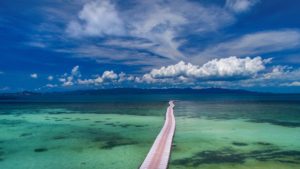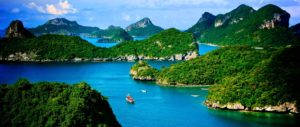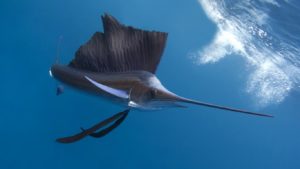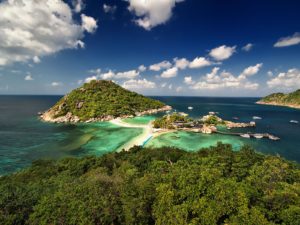Three sylvan islands in the southern part of the country implement strict laws to deal with plastic waste.
Koh Phangon
Thailand is drowning in plastic.
A report in Science Magazine way back in 2015 had already indicated that the Asian country is one of the world’s biggest contributor to ocean waste. Almost eight million plastic enters oceans every year, and Thailand is responsible for a rather large quantity of that toxic waste.
How big is the crisis? In June, this year, a pilot whale was spotted struggling to swim in Na Thap Canal in southern Thailand. Officials did try to save the endangered whale, using two boats to help it float and even constructing a sunshade, but it died due to the plastic waste in its body. Soon after, it washed ashore after swallowing no less than 80 plastic bags at sea—eight kilos of plastic were discovered in the whale’s stomach during an autopsy.
Once known as Coconut Island because of the lush coconut trees across its vast swathe, and home to just handful of fishermen and farmers until the late 1970s, Koh Samui now receives more than a million visitors a year and produces some 250,000 tonnes of trash annually. The island’s only garbage incinerator has been broken for eight years.
Koh Samui
Going down the sustainable route
Now Thailand has laid out very strict regulations for plastic disposal across popular tourist islands. The regulation has come into effect on the Thai islands of Koh Samui, Koh Phangan and Koh Tao, three of the largest beach destinations and very popular with leisure travellers. Among the strict measures enforced on the islands: a ban for at least the next two years on the feeding of marine life, wastewater dumping, fishing or anchoring on coral reefs, walking on the seabed, and new seaside construction, according to Thailand’s Department of Marine and Coastal Resources Director Jatuporn Burutphat.
The violators of this law—whether fisherman, tour operator or foreign backpacker—face a maximum fine of US$3,000 and/or a one-year prison sentence.
Sustainable travel and dealing with environment destruction
Marine Life
Over time, the Thai government has enforced several initiatives to deal with environment destruction: among them, a no-smoking and no-littering law. “The amount of garbage and wastewater on these islands is so huge that it will become unbearable in the near future,” said Jatuporn. “We have to think of the future.”
There have been several moves to restore the coral reefs on the three islands too. The administration closed several dive sites to slow the coral bleaching crisis. The tropical country’s southern coastline and a string of islands are home to some of the world’s most prized white sand beaches and scuba sites. The islands of Samui, Phangan and Tao have coral reefs spanning over 10,000 acres.
But warming waters and ever-growing swarms of visitors have damaged coral reefs and local ecosystems, forcing the National Parks department to indefinitely close at least 10 diving spots after a survey found bleaching on up to 80% of some reefs. The beautiful and rare marine life found in the Gulf of Thailand’s sapphire-blue waters include turtles, dugongs, moray eels, reef sharks, seahorses, Irrawaddy dolphins and seven species of whale, species that are vulnerable.
The move has come on the heels of beach and island closures in the Andaman Sea to allow fish stocks, coral and the environment to recover. Among the other environment-conserving initiatives Thailand has brought into force is the off-limiting of Maya Beach—famous for its scenes in the Hollywood movie “The Beach” starring Leonardo Di Caprio—to visitors.
Koh Tao
How resorts can contribute
“We are hoping this new environmental law could be a game-changer,” said Remko Kroesen, the general manager of Banyan Tree Samui, a secluded luxury resort located atop a cove with a coral reef. “Considering the critical state of the sea and our waterways on this small island, an eco-friendly initiative is well overdue. The threat from waste is very real.”
Banyan Tree recycles all plastic, metal and glass garbage, transports food waste to a local pig farm every other day, and treats all wastewater so that it can be re-used as fertilizer on the resort’s 38-acre property. Mantra Samui also recycles wastewater for irrigation and gardening, and collects rainwater, which is discharged into a tank for filtration. “In 2016, Koh Samui was experiencing the worst water shortage it had seen in over two decades,” said Niklas Wagner, general manager of Mantra Samui Resort. “We knew we had to cut back on water consumption and set about finding novel ways to recycle water.”
Banyan Tree Samui has also launched coral regeneration project under which broken coral is being brought onshore and treated, before being re-planted on the reef. Corals, which can reproduce either asexually through fragmentation/ budding or sexually, such as by spawning, are often destroyed when snorkelers or seabed walkers tread on them.
However, a lot more needs to be done to deal with environment destruction and growing pollution in the ocean which is threatening delicate marine life.






